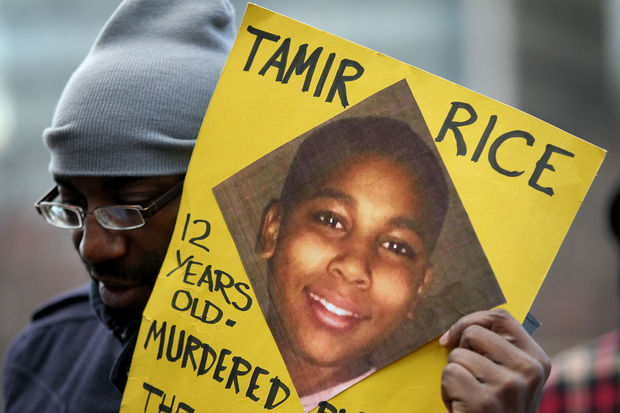I know, Tamir Rice’s mother knows, the cops and the prosecutors and the judges and the jurors all know: If it had been my son out there in the playground that day, holding any kind of gun, he wouldn’t have been shot.
It’s winter break, so yesterday morning I was home with both of my children. It involved a lot of mess-making on their part, and an even greater amount of clean-up on mine. (Note: “washable” bathtub crayons don’t wash away from the grout between tiles.) So when they were distracted, likely dismantling something, I decided I’d earned a break and huddled up in the corner of the kitchen with my coffee and my phone, settling in for a few peaceful minutes of Internet noodling. I touch and swipe, and the news about the grand jury’s non-indictment in the shooting of Tamir Rice is all over my newsfeed.
I’m not a cop or a lawyer. I don’t understand how the jurors arrived at the decision. I’m incapable of appreciating how rare it is for an expert witness to be called, how infrequently a grand jury decides not to indict. I spend a minute—this is the racism in me—a full minute tumbling down the hole of legal details before I remember: It doesn’t matter. None of the news analysis I’m scrolling through matters. Because I know, Tamir Rice’s mother knows, the cops and the prosecutors and the judges and the jurors all know: If it had been my son out there in the playground that day, holding any kind of gun, he wouldn’t have been shot.
This is what systemic racism looks like. A mother loses her son because they have brown skin, while I am allowed to keep mine. A whole segment of society is given permission to look the other way, because the rules allow for this, because it isn’t our kids who are in danger.
Imagine, for a moment, that we are talking about something other than police violence. Imagine that we are talking about vaccine-preventable illness. Stay with me here. The situations are not so dissimilar. My son, with his white skin, possesses a highly effective form of protection from police violence. Protection that Tamir Rice and other brown boys are systematically denied.
Imagine going to your pediatrician’s office and being told, if your child is white, that he will be given a vaccine against whooping cough. The vaccine will almost certainly prevent him from becoming sick, and will help your family and community remain safe from this illness. If your child’s skin is brown, you are told that your child is not allowed to have the vaccine. If you are extra cautious with hand-washing, the doctor says, your child can probably prevent his own infection. You are told that even if he does get whooping cough, he will probably survive. Only a relative handful of brown-skinned babies will die of whooping cough every year, after all. You are expected to accept this risk.
I know some parents are truly afraid of vaccines, but I think we can all agree that in a society that claims to view everyone as equal before the law, no health system would get away with denying patients treatment based on their race. And yet that is what we are doing every day when it comes to police violence. I get to send my white son, who is tall for his age, and very strong, and often waves around gun-like objects when he plays, out into the world every day without worrying that a police officer might see him as suspicious, as threatening, and shoot him. This is not a privilege I have earned. It was given to me and my son, and not to Tamir Rice and his mother.
I’m not saying that the solution to police violence is as easy as making a vaccine available to everyone. It will surely take a lot more effort to firmly dismantle our long-held racist practices. But I know, and you know, everybody knows: We could do something to prevent this from happening—something that, again, we failed to do in the aftermath of Tamir Rice’s death—and that is to hold police officers accountable.
No amount of my white liberal guilt, or my maternal empathy, or my outrage, can re-pay Tamir Rice’s mother anything close to the debt I owe her. I’m not a police officer or a judge or a politician. I’m a mom. But I am also a citizen, and I am publicly promising this, today, to anyone who cares to listen. If it is ever me on that jury, I will dissent. I will hold out. I will not back down from telling what has for so long been painfully and obviously the truth about which children in this country are seen as worthy of protection.
Marie Holmes’ work has appeared in Refinery 29, xoJane and the Washington Post, and is forthcoming in the Herstories project anthology, So Glad They Told Me: Women Get Real About Motherhood. She has also published fiction and poetry in literary journals.
Related Links:

